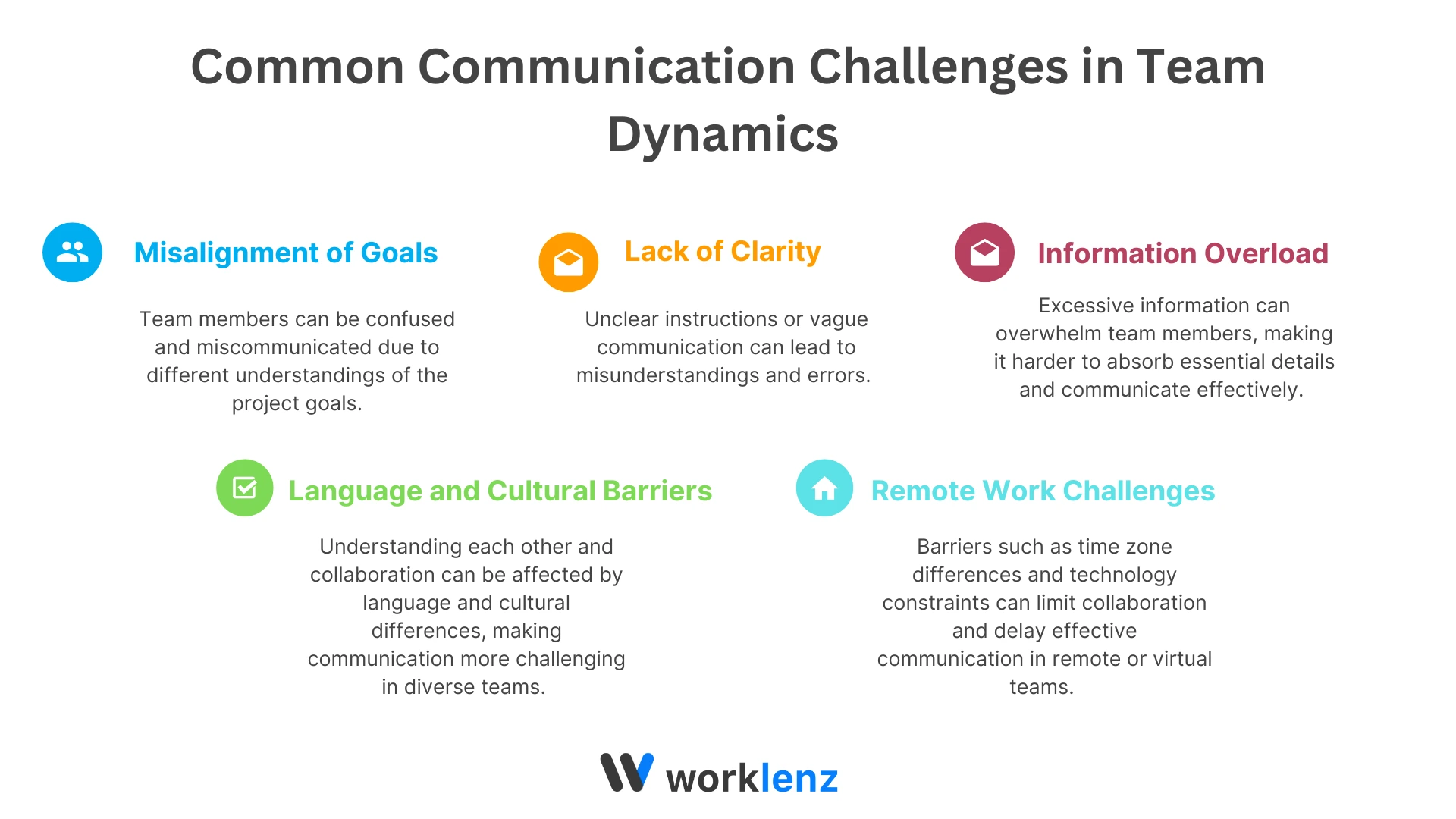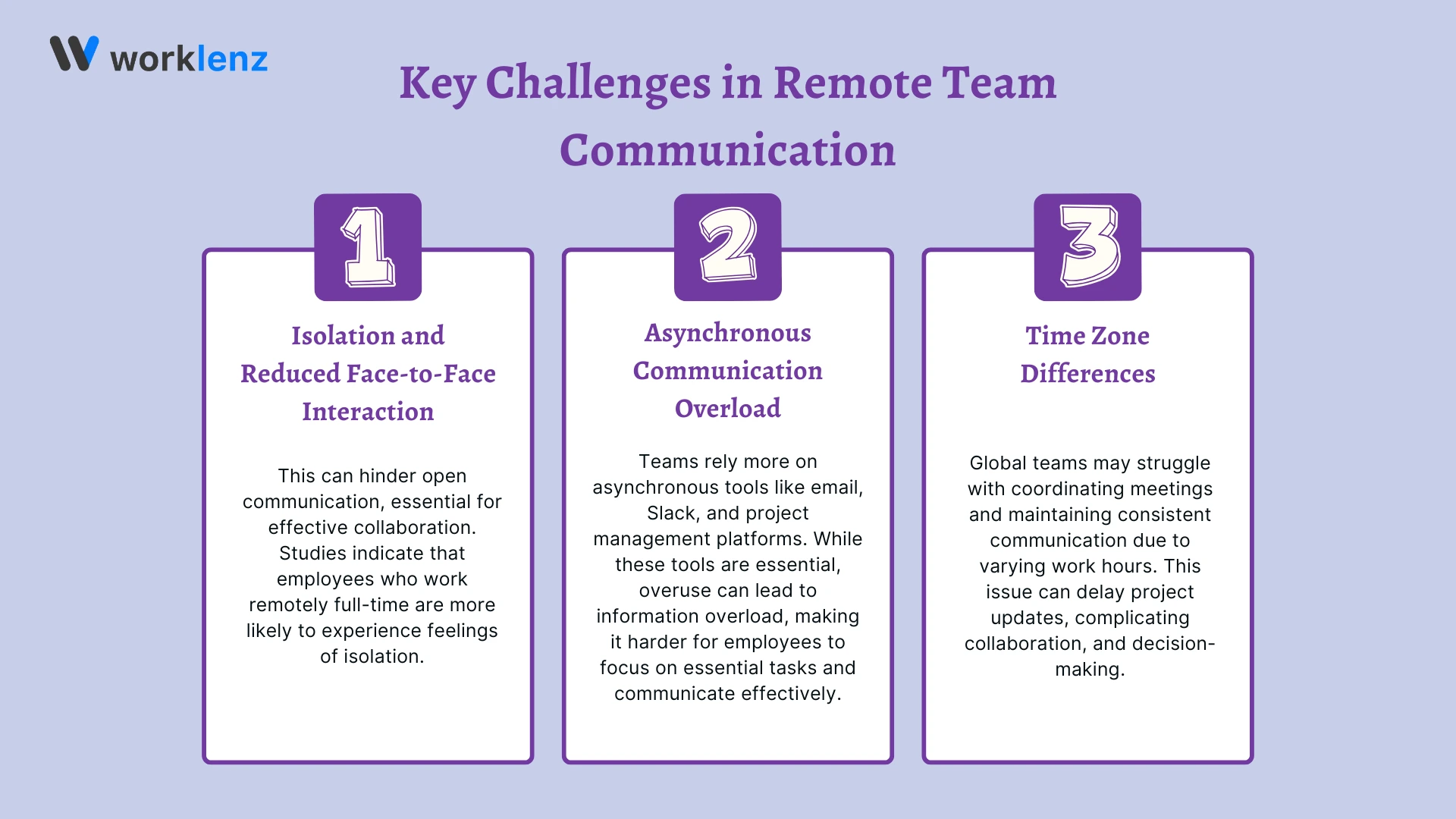Impact of Poor Team Communication on Work Dynamics - 2025 Challenges & Tips

🗣️ 86% of employees and executives cite lack of collaboration or ineffective communication for workplace failures. — Salesforce
Communication is one of the most underestimated drivers of team performance. When it falters, so do timelines, project quality, and trust within teams. From overlooked messages to unclear responsibilities, small missteps can lead to big problems. This article breaks down the real impact of poor communication on work dynamics, and what can be done to fix it.
To understand how deeply communication impacts a team’s success, let’s explore the keyways poor communication affects your team’s daily work and long-term outcomes.
Consequences of Poor Communication in Teams
1. The Domino Effect on Productivity
Miscommunication disrupts the flow of information, leading to delays, errors, and inefficiencies. A breakdown in the communication chain affects overall productivity, making it harder for teams to coordinate effectively.
2. Increased Errors and Work Inefficiency
When communication is unclear, second-hand or incomplete information causes misunderstandings. This results in mistakes, delays, and a decline in work quality, ultimately affecting team performance.
3. Low Employee Morale and Engagement
Lack of open dialogue can leave employees feeling disconnected and demotivated. Without clear guidance, team members may feel frustrated, leading to disengagement and dissatisfaction at work.
4. Impact on Team Collaboration and Decision-Making
Effective communication is essential for teamwork. When team members struggle to share ideas, provide feedback, or collaborate efficiently, it hinders decision-making and problem-solving, affecting overall team success.
| Consequence | Solution |
|---|---|
| 1. Productivity decline due to miscommunication and coordination issues | Implement regular team meetings to foster communication and provide project updates. Encourage open dialogue and create channels for feedback |
| 2. Decreased employee morale and engagement | Promote an inclusive and transparent culture where all team members feel valued and informed. Provide opportunities for team-building and recognition |
| 3. Diminished team performance and missed opportunities | Establish clear communication channels, define roles and responsibilities, and encourage knowledge-sharing and collaboration |
Overall, team communication issues can result in very serious consequences, adversely affecting productivity, team members’ motivation, and, finally, the whole team’s performance. Teams should value and work on the team’s communication and help address issues with the team’s communication. This is necessary for developing a productive and efficient work environment.
Understanding the consequences is just the first step. The real question is, how can teams overcome these challenges and build a culture of strong communication? Let’s explore the strategies that enhance collaboration and teamwork.
Enhancing Team Collaboration through Effective Communication
When it comes to fostering strong team collaboration, effective communication is paramount. It is the foundation for smooth coordination, efficient workflows, and successful project outcomes. However, teams often encounter various communication challenges within their dynamics that can hinder collaboration and hinder productivity.
Common Communication Challenges in Team Dynamics
-
Misalignment of Goals - Team members can be confused and miscommunicated due to different understandings of the project goals.
-
Lack of Clarity - Unclear instructions or vague communication can lead to misunderstandings and errors.
-
Language and Cultural Barriers - Understanding each other and collaboration can be affected by language and cultural differences, making communication more challenging in diverse teams.
-
Information Overload - Excessive information can overwhelm team members, making it harder to absorb essential details and communicate effectively.
-
Remote Work Challenges - Barriers such as time zone differences and technology constraints can limit collaboration and delay effective communication in remote or virtual teams.

Addressing communication gaps in teams often requires adopting the right tools. Open-source task management tools not only streamline workflows but also provide cost-effective solutions for enterprises looking to save resources while improving team communication. Learn more about how enterprises can save costs by using open-source task management tools.
These challenges don’t just make communication difficult—they have a measurable impact on productivity and engagement. Studies show that effective communication directly influences employee retention and business success.
How Improving Team Communication Can Boost Productivity and Morale
Expanding on the impact of poor communication, studies reveal that companies with effective communication are 4.5 times more likely to retain top talent. Furthermore, 39% of workers report they are more likely to disengage when communication is unclear. Poor communication leads to missed deadlines, low morale, and reduced productivity, costing businesses up to $420 billion annually in the U.S. alone.
Implementing effective team communication strategies to address these challenges and strengthen team collaboration is essential.
So here are some pro tips just for you.
- Promote Open and Transparent Communication
- Establish Clear Communication Channels
- Set Clear Goals and Expectations
- Practice Active Listening
- Provide Regular Updates
- Encourage Collaboration and Feedback
If there is one place to manage all these things it would be great right? There is one solution for all these needs.
To tackle these challenges, businesses need the right tools that make communication seamless. A powerful solution like Worklenz not only streamlines project management but also ensures that team collaboration remains effortless.
The Ultimate Solution - Worklenz
Worklenz is a tool created for both project management and resource management so promoting effective communication is going to be a piece of cake for you with this tool.
How?
-
Team members can share their ideas, concerns, and feedback openly through comments and update sections because transparent communication builds trust and fosters strong team relationships.
-
Can ensure all team members understand the project goals, objectives, and individual roles and responsibilities through task-assigning/management options and progress-tracking options. This clarity minimizes confusion and helps everyone stay aligned.
-
Can keep team members informed about project progress, milestones, and any changes. Regular updates enhance transparency and enable better decision-making.
There are many more convenient options just waiting for you to try.
Let us get into the next part.
Benefits of Open Communication on Teamwork
Open communication plays a vital role in the success of teamwork, bringing forth numerous benefits that contribute to a harmonious and productive work environment. By fostering strong team relationships and enhancing problem-solving abilities, effective communication serves as the foundation for successful collaboration. In this section, we will explore the valuable outcomes that arise from open communication in the context of teamwork, and the communication skills essential for achieving collective goals.
Fostering Strong Team Relationships with Communication
The power of open communication lies in its ability to foster strong team relationships. When team members feel comfortable expressing their thoughts, concerns, and ideas, a sense of trust and cohesion is established. This promotes a positive work environment where individuals feel valued and supported, leading to increased collaboration and creativity. By encouraging open dialogue, teams can navigate challenges more effectively and build lasting connections that fuel their collective success.
Enhancing Problem-Solving Abilities
Effective communication is critical when it comes to problem-solving within a team. By openly sharing information, insights, and perspectives, team members can collectively analyze challenges and develop innovative solutions. Through active listening and clear expression of ideas, open communication ensures that everyone’s viewpoints are heard and considered. This encourages a collaborative problem-solving approach, allowing teams to tackle complex issues more efficiently and arrive at well-informed decisions.
Promoting a Positive Work Environment
One of the significant benefits of open communication in teamwork is the cultivation of a positive work environment. When team members can freely express themselves, there is a sense of psychological safety, which fosters engagement, motivation, and satisfaction. Honest and transparent communication helps in resolving conflicts and managing expectations. It encourages open feedback, providing opportunities for growth and improvement. Ultimately, a positive work environment created through open communication contributes to higher employee morale and overall team success.
Key Communication Skills for Successful Teamwork
To derive the maximum benefits from open communication in teamwork, specific communication skills are essential. These include active listening, effective verbal and written communication, clarity of expression, empathy, and conflict resolution. Actively practicing these skills enhances communication dynamics within teams, enabling the smooth flow of ideas, fostering understanding, and building trust. By honing these skills, team members can create an environment that encourages open communication and maximizes the potential for successful collaboration.
Adapting to Remote and Hybrid Work: Communication Challenges and Solutions
The shift to remote and hybrid work models has drastically altered how teams communicate. With more teams working across different locations, time zones, and cultures, communication breakdowns are more common than ever. Research shows that remote work, while beneficial in many ways, can lead to silos and reduced real-time interaction, making it harder for teams to stay aligned. Miscommunication is more likely to occur, as non-verbal cues are often lost, and there’s less opportunity for spontaneous discussions.
Key Challenges in Remote Team Communication

Challenge 1 - Isolation and Reduced Face-to-Face Interaction
Remote workers often feel disconnected, leading to a lack of rapport and trust. This can hinder open communication, essential for effective collaboration. Studies indicate that employees who work remotely full-time are more likely to experience feelings of isolation.
Challenge 2 - Asynchronous Communication Overload
With fewer in-person meetings, teams rely more on asynchronous tools like email, Slack, and project management platforms. While these tools are essential, overuse can lead to information overload, making it harder for employees to focus on essential tasks and communicate effectively.
Challenge 3 - Time Zone Differences
Global teams may struggle with coordinating meetings and maintaining consistent communication due to varying work hours. This issue can delay project updates, complicating collaboration, and decision-making.
Solutions for Effective Remote and Hybrid Team Communication:
-
Use of Video Conferencing and Collaborative Tools: Regular video check-ins can recreate face-to-face communication, helping to build rapport and trust. Tools like Worklenz offer task management features that keep teams aligned even when working asynchronously, ensuring everyone knows what they are responsible for and where the project stands.
-
Clear Communication Protocols: Setting expectations for communication methods (e.g., when to use email vs. instant messaging vs. video calls) can reduce confusion and streamline workflows. Teams should establish clear guidelines for when to respond to messages to avoid constant interruptions.
-
Encourage Social Interaction: Virtual team-building activities can foster a sense of connection among remote workers, improving communication and morale.
Take Control of Your Team’s Communication Today
Poor communication doesn’t just slow down work—it creates frustration, missed deadlines, and lost opportunities. The right task management tool can bridge the gaps, ensuring seamless collaboration and transparency across your team.
With Worklenz, you can centralize communication, track progress efficiently, and eliminate bottlenecks before they impact your projects. Don’t let miscommunication hold your team back, sign up for free today or book a demo to see how Worklenz can transform the way your team works.
FAQ
1. How does a lack of communication affect teamwork?
A lack of communication can have a detrimental impact on teamwork. It leads to misunderstandings, misalignment, and confusion among team members. Without effective communication, tasks may be duplicated or overlooked, leading to a decrease in productivity and overall team collaboration.
2. What are some common communication barriers in the workplace?
Common communication barriers in the workplace include language barriers, cultural differences, poor listening skills, lack of clarity in conveying messages, and hierarchical structures that hinder open communication. These barriers can negatively affect teamwork and hinder effective collaboration.
3. What are the consequences of poor communication in teams?
Poor communication in teams can have significant consequences. It can lead to misunderstandings, conflicts, low morale, decreased productivity, missed deadlines, and a breakdown in trust among team members. Ultimately, it can result in project failure and a negative work environment.
4. How can team collaboration be enhanced through effective communication?
Effective communication plays a crucial role in enhancing team collaboration. Team members should actively listen to each other, clearly express their ideas and concerns, provide feedback constructively, and foster an open environment for sharing information. Regular team meetings, utilizing communication tools, and encouraging open dialogue can also help improve team collaboration.
5. What are the benefits of open communication on teamwork?
Open communication brings numerous benefits to teamwork. It strengthens team relationships, promotes trust and transparency, encourages active collaboration, enhances problem-solving abilities, and fosters innovation. Additionally, it creates a positive work environment and improves overall team performance.